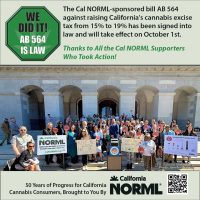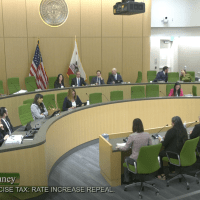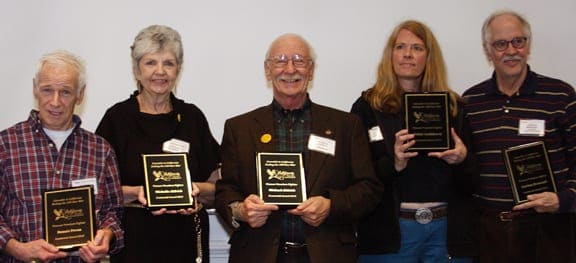 Over 300 people attended California NORML’s conference marking the 100th anniversary of marijuana prohibition in California, held January 26 & 27 at Ft. Mason Conference Center in San Francisco.
Over 300 people attended California NORML’s conference marking the 100th anniversary of marijuana prohibition in California, held January 26 & 27 at Ft. Mason Conference Center in San Francisco.
The conference began with presentations on the history of cannabis prohibition and the resistance to it. The Board of Pharmacy pushed for a law in 1913 to save Californians from the “hasheesh”-using “hindoos.” Gordon Brownell, CalNORML’s original director and other members of Amorphia, a group that sponsored the original Prop. 19 in 1972, namely Michelle and Michael Aldrich, also spoke and won “Freedom Fighter” awards, as did Dennis Peron, Debby Goldsberry and Richard Lee.
Coming on the heels of wins in Colorado and Washington, the focus was on the next steps California must take to do the same. Coalition for Cannabis Policy Reform (CCPR), a group started by the successors of the Prop. 19 campaign, CalNORML and other groups, has held an organizing meeting and its on its way, with a strong presence at the conference.
“Never in modern history has there been more support for repealing cannabis prohibition,” announced Paul Armentano of NORML, pointing to polling results as well as the wins in CO and WA. He cautioned against overreaching beyond what voters want in legalization, and not to exploit loopholes in laws that bring backlash. “Are we going to regulate cannabis like bananas, are are we going to regulate it like plutonium?” he asked.
Stephen Guttwillig of the Drug Policy Alliance introduced the team of California-based DPAers who are reaching out to needed voter groups, with a preference in wording for the microbrew model that protects small players, and a “very strong” preference for personal rights to cultivation.
Rob Kampia of MPP said there are opportunities to legalize medical marijuana in four more states in the next four years through legislative action, starting with New Hampshire, followed by Illinois (with a bill that would legalize 59 dispensaries), New York and Minnesota. In addition, Idaho is looking to put a measure on its ballot.
In California, Kampia said, there is a growing consensus that 2016 is the way to go. There are only two ways to lose, he said: poor drafting (too radical) and infighting that scares off donors. Mothers want it sold like alcohol, not tomatoes. He proposed a bill that allowed use by those over 21, with home cultivation OK, and the state government issuing four kinds of licenses for businesses, as was passed in Colorado.
For the years 2013-2017 MPP has budgeted $23 million for reform measures nationally, $14 million of that for California. “It only takes 23 rich guys to write million-dollar checks and I happen to know 23 rich guys,” Kampia said. “We’re going to see a major, major election in 2016 that is going to make the last election look boring,” he predicted.
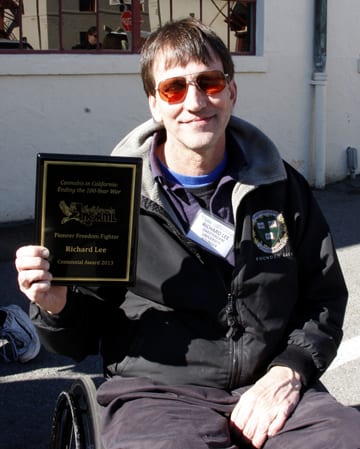 Richard Lee, the main proponent and funder for Prop. 19, said he might rewrite like Colorado’s bill: if the state doesn’t regulate, locals can. Personal cultivation wasn’t really an issue in the Prop. 19 campaign, he said, perhaps because the 25 square feet allowed was minimal compared to existing medical marijuana gardens. Colorado “put to good use” what Prop. 19 said about limitations on possession v. cultivation (you can possess at home what you grow in your garden; otherwise 1-2 oz.) “Where we screwed up” was employment rights, he said, where the campaign was hammered.
Richard Lee, the main proponent and funder for Prop. 19, said he might rewrite like Colorado’s bill: if the state doesn’t regulate, locals can. Personal cultivation wasn’t really an issue in the Prop. 19 campaign, he said, perhaps because the 25 square feet allowed was minimal compared to existing medical marijuana gardens. Colorado “put to good use” what Prop. 19 said about limitations on possession v. cultivation (you can possess at home what you grow in your garden; otherwise 1-2 oz.) “Where we screwed up” was employment rights, he said, where the campaign was hammered.
Allison Holcomb of Washington talked about getting sponsorships and endorsements for their legalization measure from the Seattle City Attorney, marijuana dependence treatment counselor Roger Roffman, US attorney John Kay, Republican Senator Michael Baumgardner who had served on a narcotics task force in Afghanistan, the Spokesman Review, Children’s Alliance. People have been showing up by the hundreds at public forums on implementing the new las. “The conversations that we’re having with public health officials, with prevention and treatment professionals, with law enforcement, with people who have been hiding in the shadows…the winning is going on, it’s unfolding,” she enthused.
“Having a narrative in the media that’s positive will be key to winning in Washington,” Holcolm said, expressing a desire to see less about “potrepreneurs” and more about human rights. “The battle that has to be won is in the court of public opinion.”
Mason Tvert said activists had been working towards their win in Colorado since 2005, with the founding of his organization SAFER, followed by a surprisingly successful legalization measure in Denver. A 2006 loss in Colorado kept the issue in play and began the building of an infrastructure of supporters across the state. They reached out to the business community and activists for input on the measure’s language, and also relied on polling data. Washington’s was a statutory initiative, allowing the legislature to tinker with it later, while Colorado’s was a constitutional amendment, allowing them to leave issues like DUI to the legislature instead.
Tvert spoke about ad campaigns that opened a “Talk it up Colorado” campaign, encouraging people to talk to their neighbors about the issue. Unlike Washington, Colorado didn’t get top endorsements and instead saw a well-funded campaign in opposition. But they won a majority of counties in Colorado, including suburban areas and conservative El Paso county, home of Focus on the Family and a military base. LEAP spoke to Rotary clubs, SSDP phonebanked to younger voters and Just Say Now did the same for older voters. 2016 is the way to go, he said, and in the meantime we need to be reaching out to the various groups we will need support from.
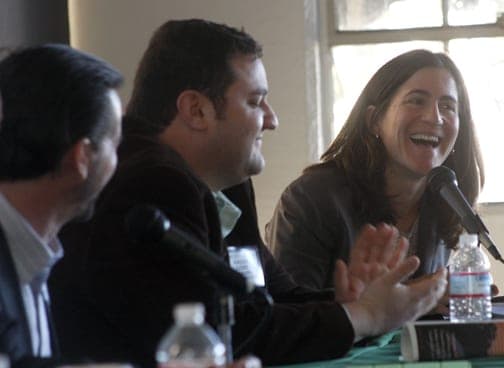 Attorney Tamar Todd of DPA, tasked with talking about the federal response to CO and WA, brought her Magic 8 Ball, which kept saying, “Better Not Tell You Now.” She pointed out that the feds have never sought an injunction against a state’s medical marijuana law, nor sought to intervene or comment on suits that have. Also, they have engaged in conversation with the states, and will perhaps try to assert authority over diversion to other states. Or, they could act as they have with medical marijuana, and interfere through attorneys. The rescheduling suit loss shows how out-of-touch the federal government is, Todd said, pointing out that the next day, the LA Times compared the DEA to a terrified and obstinate toddler.
Attorney Tamar Todd of DPA, tasked with talking about the federal response to CO and WA, brought her Magic 8 Ball, which kept saying, “Better Not Tell You Now.” She pointed out that the feds have never sought an injunction against a state’s medical marijuana law, nor sought to intervene or comment on suits that have. Also, they have engaged in conversation with the states, and will perhaps try to assert authority over diversion to other states. Or, they could act as they have with medical marijuana, and interfere through attorneys. The rescheduling suit loss shows how out-of-touch the federal government is, Todd said, pointing out that the next day, the LA Times compared the DEA to a terrified and obstinate toddler.
The conversation will shift from whether or not states can legalize to whether they can regulate, Todd predicted. The lesson for us is to implement CO and WA responsibly, because everyone will be looking to them.
Beau Kilmer of RAND Corp. said we need to ask 6 questions:
1. What do we want the price of marijuana to be post-legalization? (This has consequences for revenues). Decisions we make about production will influence the price.
2. Do you think all cannabis products should be treated the same, or does the amount of THC or ratio of THC:CBD affect its taxing or regulation?
3. How much money should be sent to public health messaging, and when should that happen?
4. Do you want to allow home cultivation and nonprofit cooperatives?
5. Do you care about how changes in the market in one jurisdiction affects others?
6. Do you want to make money from tourism? (Could bring in more money; also more resistance from federal government.)
There is a fair amount we can learn from alcohol and tobacco, as well as medical marijuana. He directed people to his webpage, www.marijuanalegalization.info/.
Funder John Gilmore talked about lessons we can learn from the failure of Prop. 5, the 2008 ballot initiative to end jail time for drug offenders. Proponents raised $7 million, but opposition defeated it with $2 million. He pointed out that Indian casinos contributed $1 million of that money, apparently because county sheriffs pressured them by threatening revocation of their liquor licenses. Since then, outreach has happened to the casinos to bring them onboard with reform. The California Correctional Peace Officers Union contributed $1 million to the opposition on October 15, despite previous assurances they would not oppose it. The California Republican Party and Meg Whitman also contributed hundreds of thousands of dollars for sensational TV ads featuring Dianne Feinstein and Jerry Brown. “What’s going to keep them from doing that to us in 2016?” he asked. “We have a lot of work to do before then.” His idea was to dedicate a portion of the tax revenue from legal pot towards the prison guards’ pensions, as well as other state employee pensions. “Instead of paying, with our tax dollars, for them to bust us and keep us in prison, we should pay them to retire,” he said to applause from the crowd.
Attorney Joe Rogoway echoed the call to dedicate taxes on legal marijuana to pensions for teachers, infrastructure and parks. “A lot of people don’t care about marijuana per se, they care about their roads, their schools, their parks, and their retirement.”
Amanda Reiman of DPA enjoined the crowd to, “Start talking to people, everyone you know…You don’t have to evangelize and school but find out where they’re at, at least get the conversation going.” Polling data shows the reasons people vote yes are specific reasons like, “I want the money to go for schools,” but when they vote against it, it’s for fuzzy reasons like, “I just don’t like marijuana” and those are the people we haven’t talked to. “We need to erase this vague idea, left over from reefer madness, that marijuana legalization is a bad idea,” Reiman said.
Dale Jones, spokesperson for the Prop. 19 campaign who is spearheading the CCPR effort, said, “You’ve convinced me that the next initiative must be simple and it must be specific.”
“What we offered in 2010 was not your perceived vision of legalization,” she said, “and in the competing initiatives of 2012 we assured failure for any one.” We must have a strong, broad coalition to make the kinds of demands that we all want, she said. Jones put out a call out for regional liaisons with CCPR, people who are already active in their communities. Lauren Vazquez and Debby Goldsberry will be coordinating CCPR’s outreach efforts.
Cal NORML plans to host another conference in LA in September 2014, the 100-year anniversary of the first marijuana arrest in California, in Sonoratown (now Olivera St.) in downtown Los Angeles.
Thanks to all the attendees, speakers, moderators and volunteers for making the 100-Year conference such a great event. Much appreciation to our generous sponsors: MedWest, Drug Policy Alliance, Bhang Chocolates, Town and Country, Tahoe Wellness, Wheels of Compassion, Culture Magazine, Celebration Pipes, Dr. Bronner’s Magic Soaps, Hemp-Tee-Ness, West Coast Leaf, Fired Up Lawyer, James Anthony, Omar Figueroa, The Arc View Group, ReLeaf of Vallejo, Bitcoin MeetUp, Oaksterdam University, Steep Hill Lab, HempAle and Chronic Ice.
Special thanks are due to Ruth Frase who did the beautiful artwork for the poster and T-shirt, Lauren Vazquez who helped tremendously with the program, Jackie Wilson who handled registrations, and Denise Martellacci who hosted breakfast. Also thanks to Chris Conrad and Mikki Norris for bringing their exhibit of prisoners of the drug war; to Nicole Coffman of NICE events for help with the Friday night party, hosted by SPARC (huge shout out to SPARC!); to Richard Wolfe for hosting the Saturday night Centiversary party, to OC NORML for staffing it, to Kim at MiniBistro.com for the delicious food, and to Bill Panzer for his expert auctioneering. CalNORML board members Debby Goldsberry and Liana Held were helpful with speaker bios and sponsor outreach. Michael McKaskle and Sue Moloney of KMUD handled visuals and audio recording. To all the volunteers, huge thanks!

